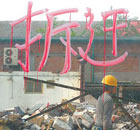Top News
Haiti government calls off search and rescue
(Agencies)
Updated: 2010-01-23 20:24
 |
Large Medium Small |
The slender student and tailor with deep-set eyes emerged so ghostly white that his mother told rescuers she thought he was a corpse. In an interview with The Associated Press, he described coming out of the shower when the quake hit.
"I felt the house dancing around me," Buso said from a bed in an Israeli field hospital. "I didn't know if I was up or down."
He told of passing out in the rubble, dreaming at times that he could hear his mother crying. The furniture in his room had collapsed around him in such a way that it created a small space for him amid the ruins of the house. He had no food. When he got desperately thirsty, he drank his urine.
"I am here today because God wants it," Buso said.
Also Friday, an 84-year-old woman was said by relatives to have been pulled from the wreckage of her home, according to doctors administering oxygen and intravenous fluids to her at the General Hospital. She was in critical condition.
Rescuers said they were encouraged but all too aware that few trapped people can survive for that long.
"Statistically you can say that the chances of survival is very low," said Fernando Alvarez Bravo, a representative in Mexico for rescue crews founded during the 1985 Mexico City earthquake, and still at work in Haiti on Friday. "But the hope it gives the population to recover and find their loved ones helps them to recover quickly. They don't feel abandoned."
The rescues came two days after many international search teams began packing up their gear and other aid groups remained to grapple with challenges of helping survivors.
In the three miles (five kilometers) or so between Port-au-Prince and hard-hit Carrefour, satellite images show 691 blockages on the road - collapsed houses or other debris - the UN reported.
In just one day, however, the U.S. Navy hospital ship Comfort had made a difference. The giant white ship, which dropped anchor on Wednesday, had treated 932 patients and performed 32 surgeries by midday Thursday, USAID reported.
President Rene Preval's administration as working with the United Nations Development Program and other aid groups to restore electricity and telecommunications, reopen banks, businesses and money-transfer houses, and to provide at least low-paying jobs to Haitians desperate for income.
But it could take as long as three or four months to restore electricity in Port-au-Prince, which is now using generators.
Amid a scarcity of goods, prices have tripled for some products in Haiti, a poor Caribbean nation where 80 percent of the people survive on less than $2 a day.
"Inflation is eating them alive," said UN Development Program worker Eliane Nicolini.






